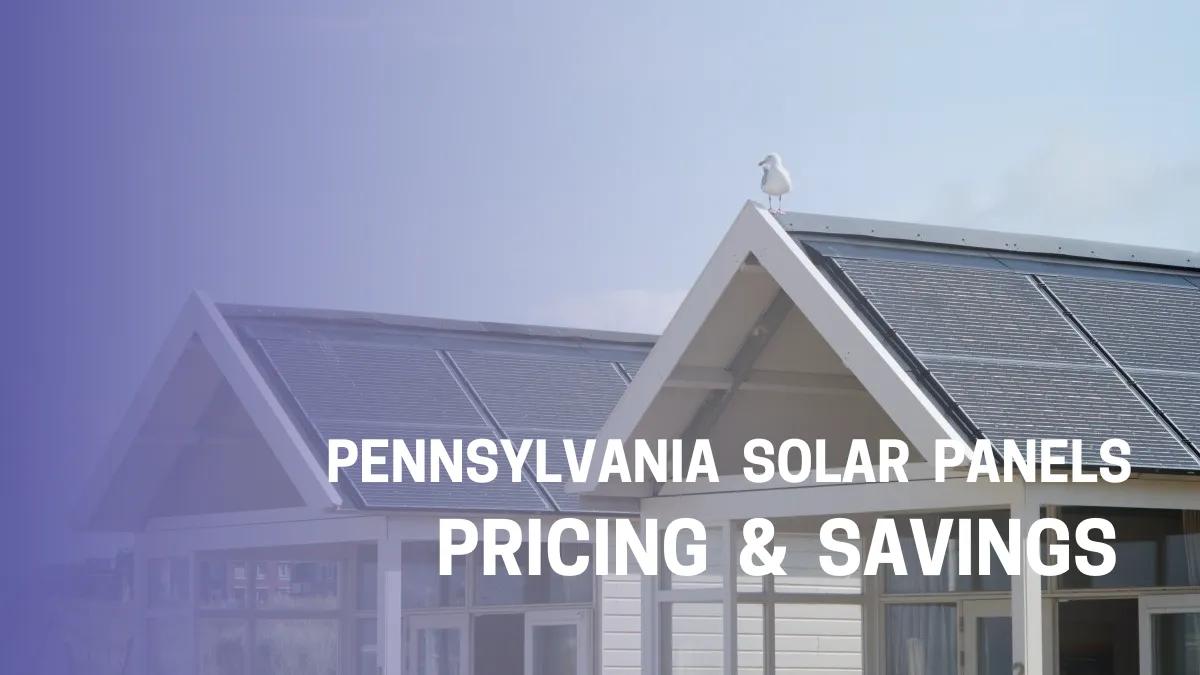Pennsylvania Solar Panels 2023: Pricing & Savings (Guide)
By: HomeOtter Team
Mar 30th 2023
Time: 10min
Solar panels in Pennsylvania have become a highly sought-after energy solution for homes and businesses across the Keystone State. And why not? Clean, renewable, and having a minimal carbon footprint, solar power makes environmental sustainability seem more approachable while saving on energy costs.
Despite solar panels being all the rage in Pennsylvania, many are still skeptical and hesitant about taking the plunge. If we look at the graphs, the hesitation to switch to renewable energy is mainly because of the sensed costs and intricacies linked to it.
We cannot deny the fact that initial investment in solar panels tends to be higher than the traditional energy sources but the long-term savings and benefits by far overshadow the costs.
That's why we've created this comprehensive guide to help you navigate the world of Pennsylvania solar panels. It’s time to explore in depth the factors that shape solar panel pricing in Pennsylvania and know the real deal aka the actual pricing.
By the time you’re done reading this 10-minute guide, you’ll understand the costs and savings associated with solar power and make an informed decision about your energy future.
Pennsylvania Solar Panels: How Much Do They Cost?
Pennsylvania is an excellent state for solar energy systems. From net metering to Solar Renewable Energy Certificates, the state offers a wealth of incentives and rebates to help homeowners and businesses transition to solar energy production. However, many people are unsure about how much solar panels cost in Pennsylvania. Let’s take a look.
Average Solar Panel Installation Cost In Pennsylvania
The average out-of-pocket cost of a 5-kilowatt (kW) residential solar installation in Pennsylvania is approximately $12,900 to $17,500 before any tax incentives. So basically, the cost per watt for installing solar panels would be anywhere from $2.40 to $4.00. On average, it ends up being around $3.05 per watt.
After the tax rebate, the cost can come down to $9600-13,000 for a 5-kilowatt (kW) solar unit.
2 Financing Options For Pennsylvania Solar Panels
The purpose is to make solar paneling approachable for everyone. After all, we are talking about environmental sustainability here. That is why the presence of financing assistance to install a solar panel is valued in Pennsylvania.
a. Solar Leasing
One popular financing option is solar leasing. You can lease or rent a solar energy system for anywhere between 10 to 20 years. The highlight of solar leasing is the cutback on the upfront costs. A typical solar lease in Pennsylvania might cost between $50 to $150 per month.
b. Solar Loans
Another financing option for Pennsylvania solar panels is solar loans. Solar loans may require an upfront down payment which may vary depending on the price of solar panels. You might end up paying an interest rate between the range of 3.49% to 6.49% p.a.
How Much Can You Save By Installing Solar Panels In Pennsylvania?
There is good news for all Pennsylvanians - the state encourages its residents by offering some of the best incentives and policies for solar energy systems in the country. It means with solar installations, you can expect a major saving on the ka-chings that fly away with your electricity bills otherwise.
To calculate your savings from solar panels in Pennsylvania, you'll need to consider a few factors.
First steps first, calculate how much electricity you consume in a year. This can be easily done by observing your utility bills.
Next, analyze your household power needs. This will help you give a definitive picture of the size of the solar energy system you will be needing to generate enough electricity.
Once you have a clearer picture of the magnitude of the solar energy system your household requires, calculating the cost of the system and any applicable tax credits, rebates, or incentives will not be an issue.
As a rule of thumb, a solar energy system in Pennsylvania can easily generate about 1200 kWh of electricity per year for every kW of capacity. So if you install a 5 kW solar energy system, it can generate 6000 kWh of electricity per year.
If we base our calculations on the current electricity cost in Pennsylvania which is $0.14 at the moment, you can slash your yearly electricity bill by $840 - that is if you install a 5 kW solar energy system. Over the lifetime of your solar installation, which is typically around 25 years, this adds up to savings of over $21,000.
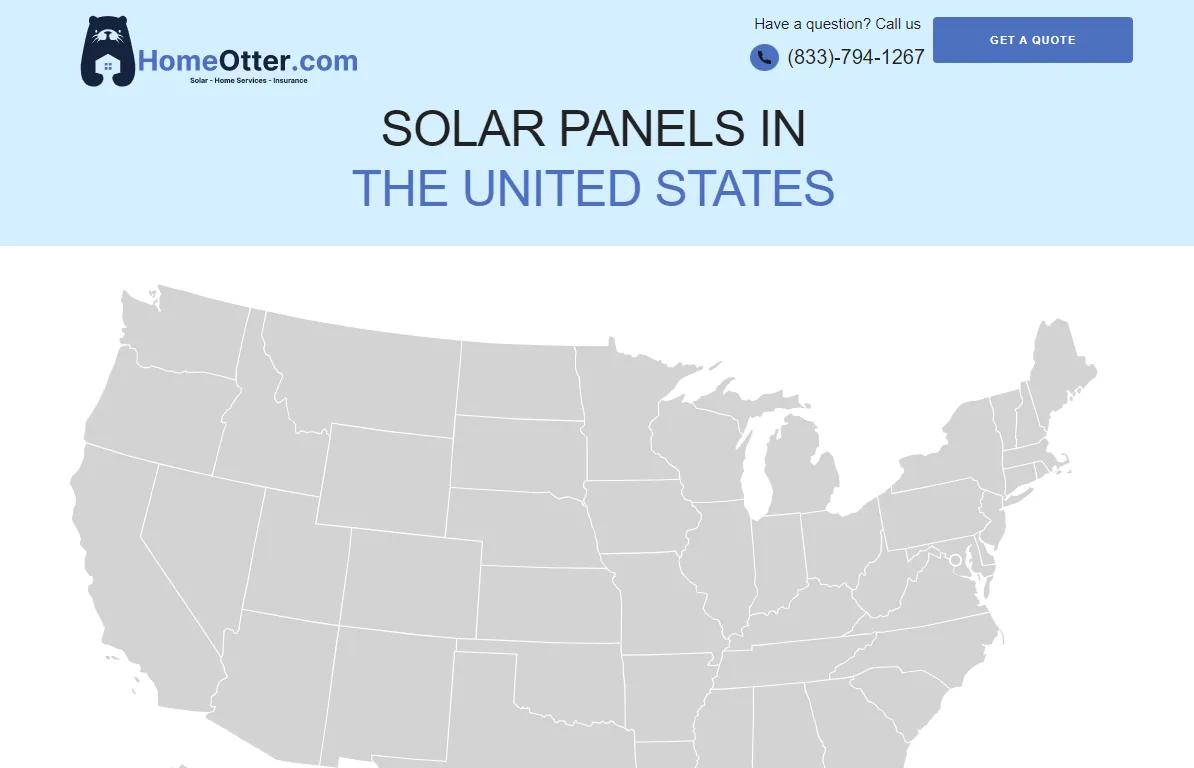
With years of experience working with the most reputable solar panel companies, we at HomeOtter have built a solid reputation in Pennsylvania. We only partner with companies that provide high-quality solar products and components that are built to last. We also ensure that we onboard solar companies that have a team of certified engineers, solar installers, and electricians to ensure the projects are completed to the highest standards.
We also provide you with an accurate solar report that you can get in under five minutes, you’ll know the up-front, out-of-pocket cost estimate for your solar panel installation. You’ll also get a solar installation size that best suits your needs.
The report also includes a cost-benefit analysis of different options, such as leasing, buying with cash, or financing solar panels. It helps break down the number of years until payback, giving you a clear understanding of the ROI.
The Impact Of Net Metering On Solar Savings
One of the key policies that make solar energy systems a smart investment in Pennsylvania is net metering. Net metering allows you to earn credits on your electricity bill for any excess electricity your solar panels generate that you don't use.
They help you buy more energy or in literal terms, can be used to balance out the cost of any electricity you use from the grid when your solar panels are not generating enough electricity. One wonderful aspect of net metering in Pennsylvania is that the credits obtained from it are valued at the same rate as the retail price of electricity.
Let’s say your solar energy system generates 6000 kWh of electricity per year but you only use 5000 kWh. The remaining 1000kWh will be your golden ticket to earn more credits on your electricity bill. So at 14 cents per kWh, you can easily earn a credit of $140. And over the lifetime of your solar installation, this adds up to significant savings on your electricity bills.
The Payback Period For Pennsylvania Solar Panel Systems
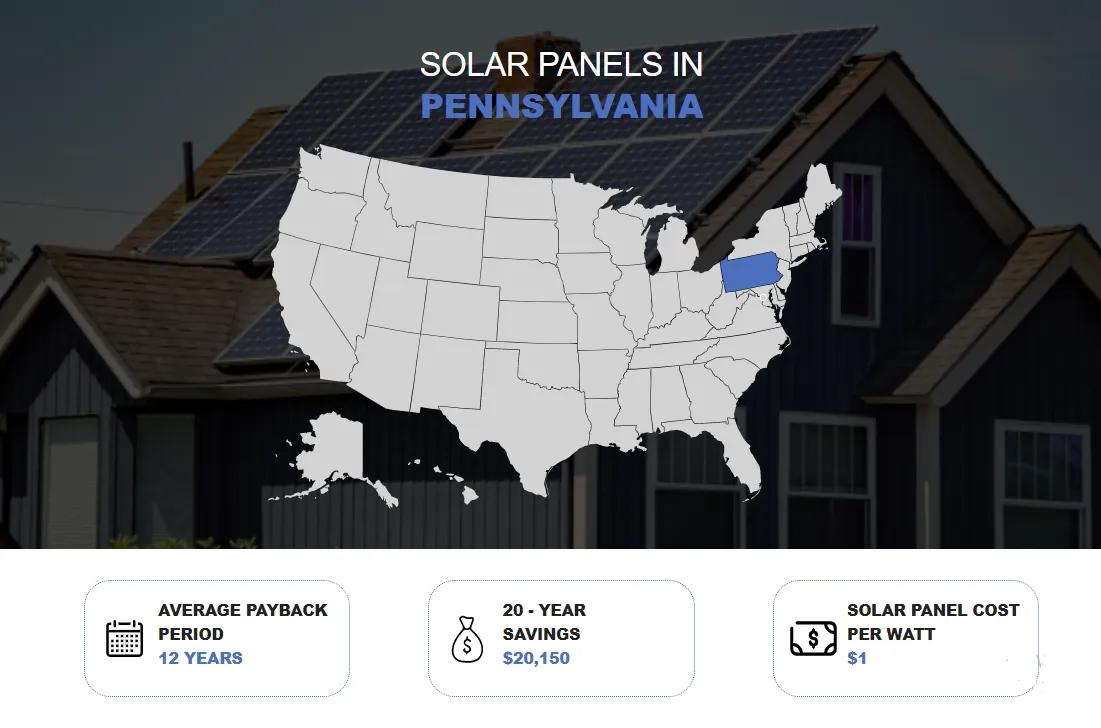
Amidst all the calculations, let's not forget that the payback period is an important factor to consider when deciding whether to invest in solar panels in Pennsylvania. A payback period is simply the amount of time it takes for your solar energy system to pay for itself via savings on your electricity bills.
On average, the payback period for solar panel systems in Pennsylvania is around 12 years, but you can expect any duration between 8 and 14 years.
While we talk about the payback period, let’s be clear that in Pennsylvania, this whole period can vary depending on several factors, including:
- Size of your system
- Cost of electricity in your area
- The efficiency of your solar energy system
- Incentive or federal tax credit that you may qualify for
Now that you know the costs and savings associated with getting a solar system for your home, let's understand the dynamics of the Pennsylvania solar market.
A Detailed Overview Of The Pennsylvania Solar Panel Market
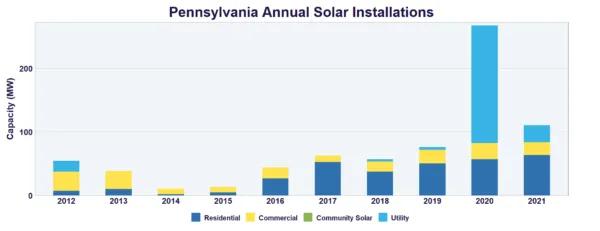
Solar power is a rapidly growing industry and Pennsylvania is no exception. Because of various Pennsylvania solar incentives, the state’s solar panel market has been showing steady growth over the past few years. Let’s take a more in-depth detail.
Current Status Of The Pennsylvania Solar Panel Market
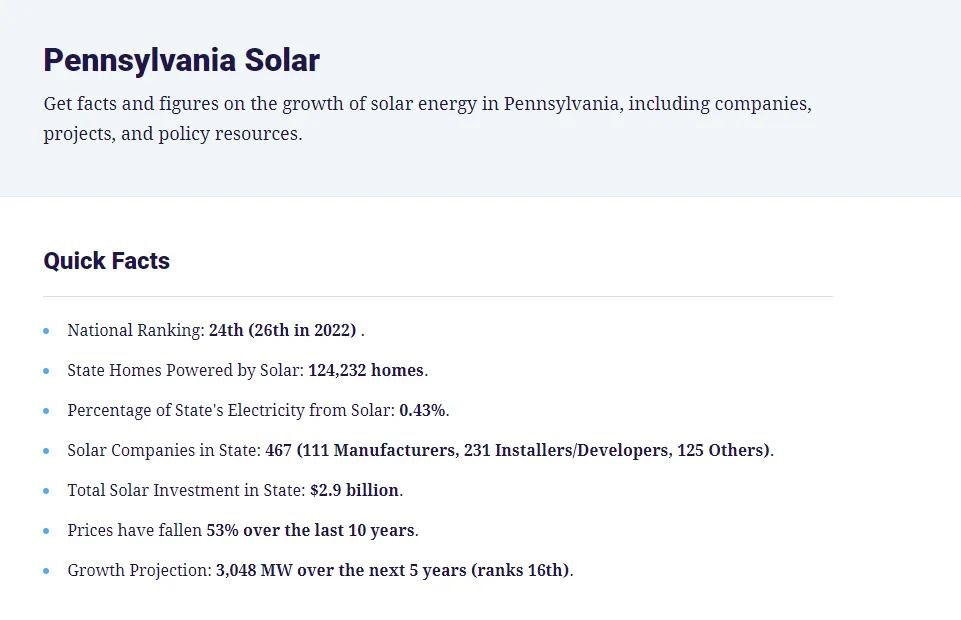
The Pennsylvania solar panel market has been showing steady growth over the past few years. As reported by Solar Energy Industries Associations, Pennsylvania ranked 24th among the states in terms of solar installation growth in 2023, with a total installed capacity of 1036 MW. The growth projection for Pennsylvania solar energy is 3048 MW over the next 5 years.
One reason for the growth of the solar market in Pennsylvania is the declining costs of solar panel installations. In fact, the cost of solar panels has fallen by 53% in Pennsylvania over the last 10 years.
Another reason for its growth t is the state's renewable portfolio standard (RPS). The RPS requires that 18% of Pennsylvania's electricity be generated from renewable sources by 2023. This policy has been instrumental in increasing the adoption of solar power and many businesses and homeowners are switching to solar power to meet the RPS targets.
Pennsylvania has also seen significant growth in community solar projects. Through these projects, people who cannot install solar panels on their property can purchase solar energy from a community solar project. Pennsylvania has implemented policies to support community solar and several projects have been developed in the state.
Government Incentives For Solar Panels In Pennsylvania
Pennsylvania offers several incentives for homeowners and businesses who choose to install solar panels. These incentives urge more and more Pennsylvanians to put aside their fear and get their feet wet. The main mission of these plans is to enhance the affordability and accessibility of solar panels for the masses.
Here are some of the government incentives available for solar panels in Pennsylvania:
A. Solar Renewable Energy Credits (SRECs)
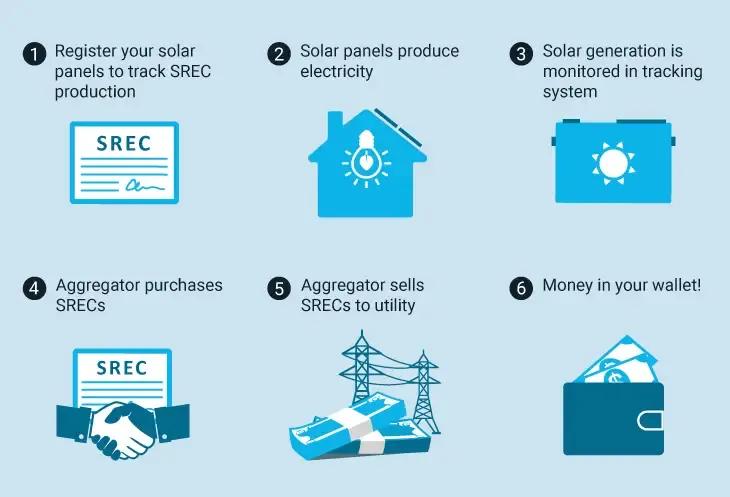
SRECs are certificates that represent the environmental benefits of generating electricity from solar power. Each SREC represents one megawatt-hour (MWh) of electricity generated by a solar panel system. Pennsylvania requires electricity suppliers to purchase a certain number of SRECs each year to comply with the state's renewable energy requirements.
Homeowners and businesses who install solar panels can earn SRECs for the electricity their solar panel systems generate and then sell them in the SRECs market. This way, the installation cost of the solar panels can be offset, making solar power super affordable.
B. Solar Incentive Program (SIP)
There are 63 solar incentive programs (SIP) and policies that are funded by the state to provide advantages to residential and small business owners. One just has to find the right one that will help balance out the costs in the most effective manner.
C. Tax Incentives
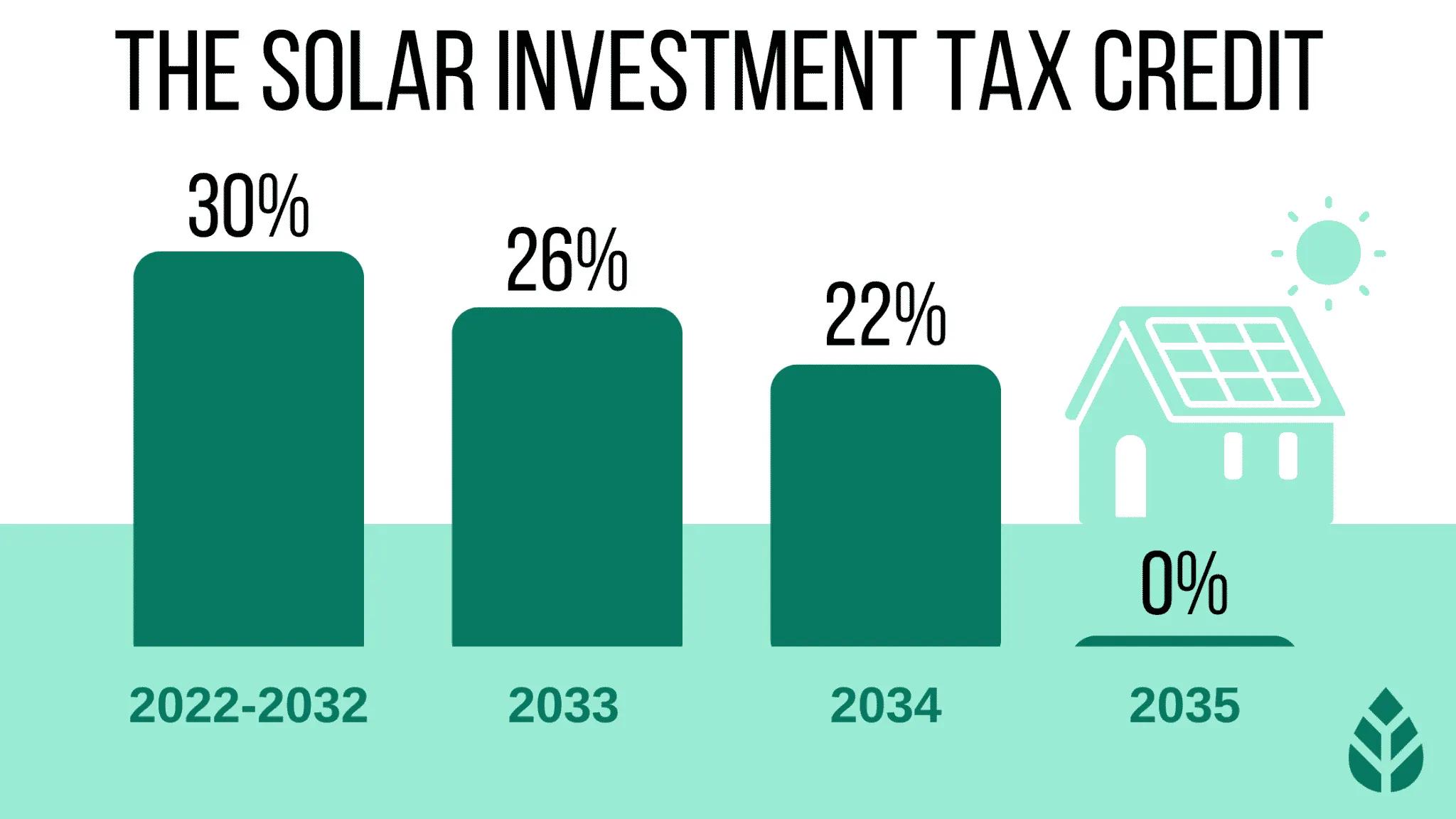
In 2022, the federal government raised the solar Investment Tax Credit (ITC) from 26%. Now individuals and businesses can claim a tax credit for up to 30% of the total solar panel installation cost. This tax credit has been extended until 2032 which will provide further solar incentives to new users.
D. Net Metering
The concept is simple - unused electricity generated by the solar panel system is sent back to the grid and the homeowner or the business receives credit on their utility bill. This offsets the cost of installing solar panels and makes solar power more viable. Currently, the Pennsylvania government is purchasing solar electricity at the commercial rate from the producers.
Now that we are familiar with the solar panel market in Pennsylvania, let’s take a look at the factors that influence the cost of solar panels.
4 Major Factors Affecting Pennsylvania Solar Panel Pricing
The four major factors include.
I. Size Of The Solar Panel System
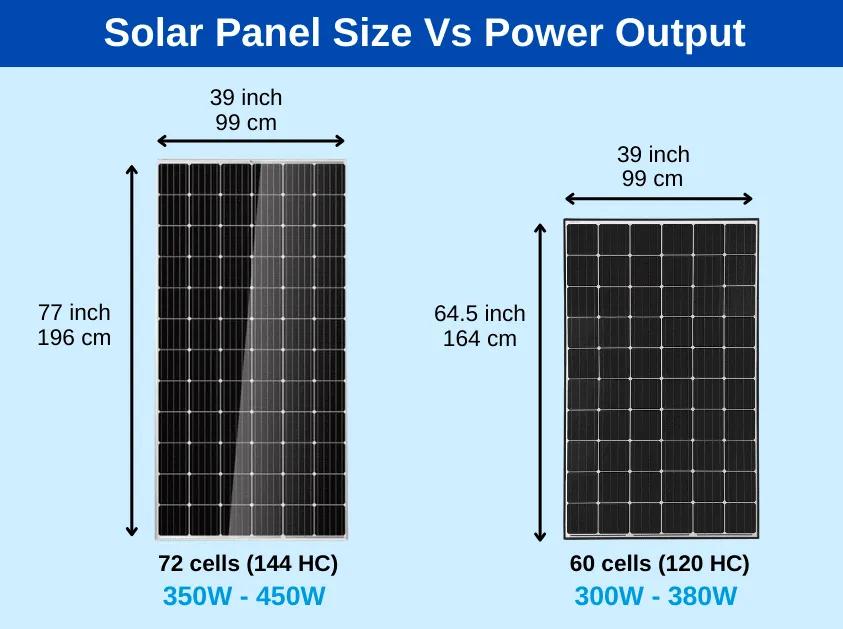
Needs are directly proportional to energy usage here. This will help you determine the size of the solar system you should invest in. Finding the exact amount of your consumption is not rocket science.
You can easily review your energy bills for the past year to calculate the average energy your household needs for its running.
Once you have a grasp on this part, communicate and work with your solar installer to know what size of the solar system will be apt for your needs. A larger solar system will require more solar panels, needless to say, which will amplify the cost of the solar energy system.
A larger solar system can generate more electricity which saves more money on your energy bills. And the cherry on top here is that the excessive production is not going to go down the drain. It will help you gain more credits while further easing your energy costs.
II. Type & Quality Of Solar Panels
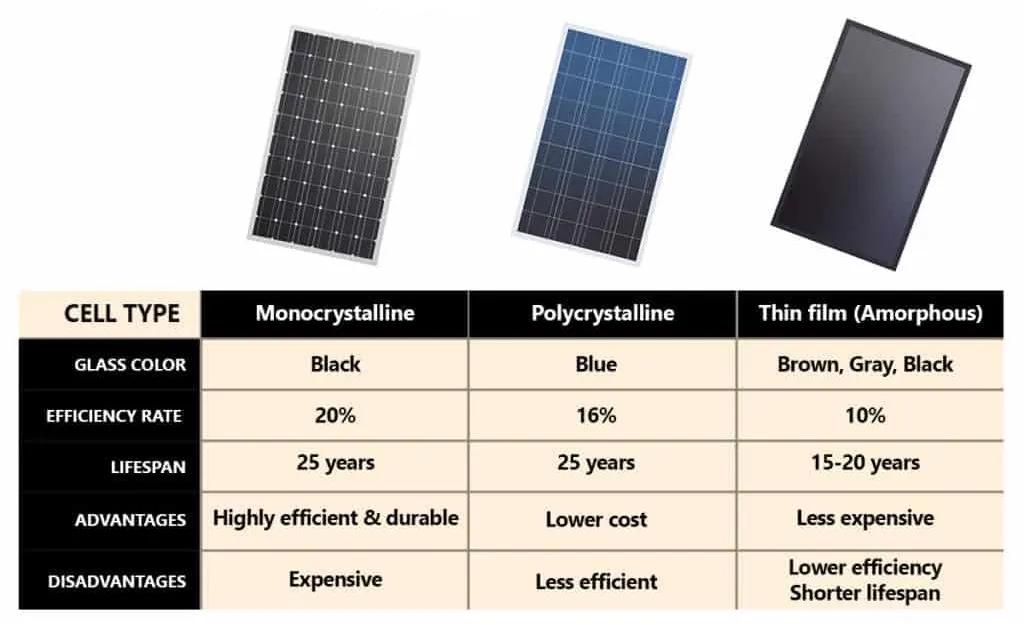
The type and quality of solar panels are important factors that affect the price of a solar energy system in Pennsylvania. It can impact the amount of energy your system can generate, its efficiency, and its longevity. Higher-efficiency solar panels can generate more electricity with fewer panels, which can help you save money on your solar energy system.
The quality of solar panels also impacts their lifespan and performance. High-quality solar panels are made with better materials which increase their durability. Cheaper solar panels may be made with lower-quality materials and have shorter lifespans, which can result in more frequent replacements and higher long-term costs.
The solar panel brand that you choose also impacts the price. Some brands are more expensive than others but may offer additional benefits such as longer warranties or better performance in certain conditions.
III. Mounting & Installation Costs
Mounting and installation costs are other key factors that can impact the overall price of a solar energy system. And these are directly or indirectly linked to the labor and materials needed for the installation of the solar panels and giving them a connection to your electrical system.
The cost of mounting and installation can vary depending on:
- Location of your property
- Size of the solar energy system
- The complexity of the installation
The type of mounting system you choose also impacts the cost of installation. There are several different types of mounting systems, including:
- Ballasted mount: Ballasted mount systems use weights to hold the solar panels in place
- Tilt mount: Tilt mount systems allow the panels to be adjusted for optimal sunlight exposure
- Flush mount: Flush mount systems are the most common and attach the solar panels directly to your roof
The installation cost also depends on the location of your property as remote areas may require installers to travel further, which can increase the cost of labor.
IV. Local Labor & Permit Costs
Local labor and permit costs are additional factors that impact the overall price of a solar panel system.
Permit costs heavily depend on the location where you need the solar panel to be installed. Some areas require additional permits or inspections which increases the overall cost. Additionally, permit costs also depend on the size of the solar energy system, with larger systems often requiring more permits and inspections.
Labor costs are another important factor that cannot be forgotten when evaluating the price of a solar energy system. This may include electrician and non-electrician labor costs. Generally, the labor cost is 10% of the complete solar panel system price.
Conclusion
Renewable energy is the new effective way to be. No longer is it considered to be just a trend or a luxury item since the masses are accepting it as an asset or a practical investment. It’s evidently beneficial to both the environment and your earnings. And with the state and federal incentives available, the upfront costs can be even more manageable.
We are not implying that investing in a solar panel is as simple as buying a light bulb. It requires careful consideration of your energy needs, budget, and goals, as well as a reputable and knowledgeable installer to ensure the job is done right.
Choosing HomeOtter for this means that you'll get access to a network of highly reliable solar panel providers, each offering a range of services, from consultation and installation to maintenance and repairs. All solar companies that we work with are known for providing top-quality solar products and extraordinary customer support.
We know that investing in solar panels is an important decision that requires careful consideration. That's why we provide a custom solar report that gives you a detailed cost analysis and savings with different payment options.
It’s time to put a stop to the thinking and put a go-to action. It's time you put your trust in HomeOtter. Contact us today to get your custom solar report and start saving on your energy bills.
